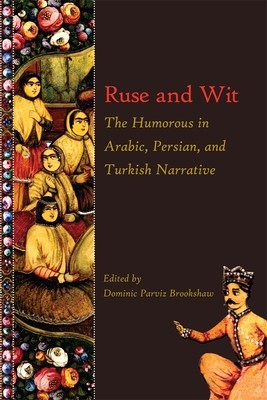
- We will send in 10–14 business days.
- Publisher: Ilex Foundation
- ISBN-10: 0674066707
- ISBN-13: 9780674066700
- Format: 15 x 22.6 x 1.3 cm, softcover
- Language: English
- SAVE -10% with code: EXTRA
Ruse and Wit (e-book) (used book) | bookbook.eu
Reviews
Description
The essays in Ruse and Wit examine in detail a wide range of texts (from nonsensical prose, to ribald poetry, titillating anecdotes, edifying plays, and journalistic satire) that span the best part of a millennium of humorous and satirical writing in the Islamic world, from classical Arabic to medieval and modern Persian, and Ottoman Turkish (and by extension Modern Greek). While acknowledging significant elements of continuity in the humorous across distinct languages, divergent time periods, and disparate geographical regions, the authors have not shied away from the particular and the specific. When viewed collectively, the findings presented in the essays collected here underscore the belief that humor as evidenced in Arabic, Persian, and Turkish narrative is a culturally modulated phenomenon, one that demands to be examined with reference to its historical framework and one that, in turn, communicates as much about those who produced humor as it does about those who enjoyed it.
EXTRA 10 % discount with code: EXTRA
The promotion ends in 20d.14:50:46
The discount code is valid when purchasing from 10 €. Discounts do not stack.
- Publisher: Ilex Foundation
- ISBN-10: 0674066707
- ISBN-13: 9780674066700
- Format: 15 x 22.6 x 1.3 cm, softcover
- Language: English English
The essays in Ruse and Wit examine in detail a wide range of texts (from nonsensical prose, to ribald poetry, titillating anecdotes, edifying plays, and journalistic satire) that span the best part of a millennium of humorous and satirical writing in the Islamic world, from classical Arabic to medieval and modern Persian, and Ottoman Turkish (and by extension Modern Greek). While acknowledging significant elements of continuity in the humorous across distinct languages, divergent time periods, and disparate geographical regions, the authors have not shied away from the particular and the specific. When viewed collectively, the findings presented in the essays collected here underscore the belief that humor as evidenced in Arabic, Persian, and Turkish narrative is a culturally modulated phenomenon, one that demands to be examined with reference to its historical framework and one that, in turn, communicates as much about those who produced humor as it does about those who enjoyed it.


Reviews